| Srl | Item |
| 1 |
|
| 2 |
ID:
130549
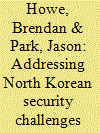

|
|
|
|
|
| Publication |
2014.
|
| Summary/Abstract |
Purpose-Discuss the potential of non-state centric economic cooperation.
Design/methodology/approach-Traditional engagement policies vis-à-vis North Korea have been state-centric, reciprocity-driven and ultimately, unsuccessful. This article proposes the promotion of sustainable, good-faith and meaningful economic exchanges by enrolling the active participation of North Korean elites through alignment with their vested interests.
Findings-Although controversial and even abhorrent from a normative perspective, the approach is eminently pragmatic and necessary to address the limited policy alternatives of an increasingly insecure regime which may eventually be forced to pursue drastic means to ensure its survival.
Practical implications-Non-state-centric international economic engagement is a non-exclusive policy prescription that seeks to broaden the range of viable policy options available to the North Korean regime.
|
|
|
|
|
|
|
|
|
|
|
|
|
|
|
|
| 3 |
ID:
126247
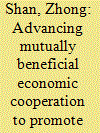

|
|
|
| 4 |
ID:
132344
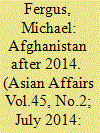

|
|
|
|
|
| Publication |
2014.
|
| Summary/Abstract |
A number of the NGOs now working in Afghanistan, like Oxfam, Afghan Aid and the Agha Khan Foundation have been there for many years and show no sign of planning to leave when NATO troops withdraw. This article is written by a committee member of the Norwegian Afghanistan Committee, which was formally established in Bergen in 1980, as a political reaction to the Soviet invasion. In 1983, the Committee started sending health workers into unoccupied areas of the country and their activities have continued ever since, though the Soviets left nearly a quarter of a century ago. The goodwill and contacts built up over time by the Committee and other NGOs have been important in validating their presence, their activities and their motives. To be useful in Afghanistan needs a commitment to the long haul.
|
|
|
|
|
|
|
|
|
|
|
|
|
|
|
|
| 5 |
ID:
138737
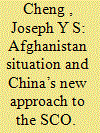

|
|
|
|
|
| Summary/Abstract |
This article examines China’s concern to prevent terrorism and maintain stability in Central Asia through the SCO. The situation in Afghanistan has raised concerns among SCO member countries and strengthened common interests to maintain the regional organization, regime stability, and economic co-operation within it.
|
|
|
|
|
|
|
|
|
|
|
|
|
|
|
|
| 6 |
ID:
064734
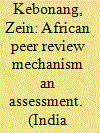

|
|
|
|
|
| Publication |
Apr-Jun 2005.
|
|
|
|
|
|
|
|
|
|
|
|
|
|
|
|
| 7 |
ID:
131794
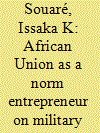

|
|
|
|
|
| Publication |
2014.
|
| Summary/Abstract |
Between 1952 and 2012, there were a total of 88 successful military coups in Africa. Of those, 63 occurred prior to 1990, and 10 cases since the adoption, by the defunct Organization of African Unity (OAU), of the Lomé Declaration in July 2000, banning military coups and adopting sanctions against regimes born out of this. The article shows that the African Union (AU) has followed in the footsteps of the OAU in this regard. Assisted by some African regional organisations and international partners, the combined effect of this policy of the AU - assisted by other factors - has been a significant reduction in the occurrence of this phenomenon. While not constituting a funeral arrangement for military coups in the immediate future, these developments - if they were to continue - may indeed make this eventuality achievable in the long run. But the article also reveals some challenges the AU is facing in ensuring this.
|
|
|
|
|
|
|
|
|
|
|
|
|
|
|
|
| 8 |
ID:
134217
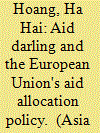

|
|
|
|
|
| Publication |
2014.
|
| Summary/Abstract |
This paper analyses the motivation determining the European Union's (EU) aid allocation to Vietnam. Existing literature and EU official documents are used to build upon four models with respect to new aid allocation: donor interest, recipient interest, recipient capacity and potential donor influence. The paper concludes that the EU's aid policy in Vietnam has a long-term objective in conformity with Vietnam's development strategy-poverty alleviation. Moreover, the EU's political and economic interests, a successful economic reform and development strategy, a high level of ownership (good governance) and potential donor influence are identified as contributions to make Vietnam an 'aid darling'.
|
|
|
|
|
|
|
|
|
|
|
|
|
|
|
|
| 9 |
ID:
127061
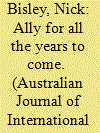

|
|
|
|
|
| Publication |
2013.
|
| Summary/Abstract |
In 2011, Australia communicated a clear choice about its strategic future. It would continue to cleave tightly to the US alliance, expand its military links and work to advance the USA's conception of regional order. Given its economic interests, why has Australia bound itself to the US alliance? What lies behind this strong commitment and what would it take for Australia to change its relationship with the USA? This article presents an analysis of the current state of the US-Australia alliance and argues that Canberra's pursuit of close relations with the USA reflects the interaction of a rational calculation of the costs and benefits of the alliance with a set of resolutely political factors that have produced the current policy setting. The article first assesses the security cost and benefit behind the alliance. It then argues that the move also derives from the strong domestic support for the US alliance, a sharpened sense that China's rise was generating regional instability that only the US primacy could manage and the realisation that the economic fallout of such a move would be minimal. It concludes with a brief reflection on what it might take to change the current policy settings.
|
|
|
|
|
|
|
|
|
|
|
|
|
|
|
|
| 10 |
ID:
056095


|
|
|
| 11 |
ID:
061847
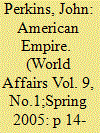

|
|
|
| 12 |
ID:
023071
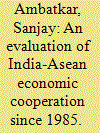

|
|
|
|
|
| Publication |
Autumn 2002.
|
| Description |
72-72
|
|
|
|
|
|
|
|
|
|
|
|
|
|
|
|
| 13 |
ID:
120027
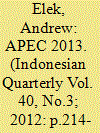

|
|
|
| 14 |
ID:
114054
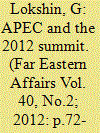

|
|
|
|
|
| Publication |
2012.
|
| Summary/Abstract |
The twentieth summit of the Asia-Pacific Economic Cooperation (APEC) is to be held on Vladivostok's Russky Island on September 8-9. 2012. The technical problems of preparing for the summit, covered in detail in the Russian media, all but eclipsed the basic content of the upcoming forum in the eyes of the public: the actual state of affairs in APEC; its opportunities, challenges, and outlook; and the benefits that might accrue to Russia if she follows the right policy.
|
|
|
|
|
|
|
|
|
|
|
|
|
|
|
|
| 15 |
ID:
053820
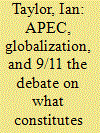

|
|
|
| 16 |
ID:
131029
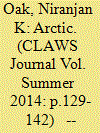

|
|
|
|
|
| Publication |
2014.
|
| Summary/Abstract |
Regionalism as a political project has been a signi?cant phenomenon in post-1945 international relations. The third phase of regional integration began towards the end of the 19805 within the international context created by the end of the Cold War. Academics dubbed it as "new regionalism".' Most of the regional organisations that came up in those days were based on economic cooperation among the states. It was an era of globalisation. The Arctic Council (AC) which emerged in 1996 was a unique case. The 'Arctic' has emerged as a region in international cooperation during the past 20-30 years, as manifest in the creation of the AC. The objective of the AC was sustainable development and environmental protection only, and that is why it may be termed as a unique case in that period.
|
|
|
|
|
|
|
|
|
|
|
|
|
|
|
|
| 17 |
ID:
151119
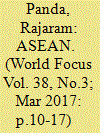

|
|
|
|
|
| Summary/Abstract |
The Association of Southeast Asian Nations (ASEAN), founded in 1967, has proved to be one of the most successful regional organisations, whose example as a model is often cited when similar ideas are floated elsewhere. Started initially with five core members, it subsequently expanded to the present ten countries as members of the organisation. The primary focus in the initial phase of its existence was on economic cooperation. In the subsequent years, it started embracing security/strategic issues and threats to non-traditional security keeping in tune with changing times. The latest in this journey is the founding of the ASEAN Economic Community, which was established in 2015. This essay examines its evolution, performance and some of the challenges confronting the organisation and what future holds for it.
|
|
|
|
|
|
|
|
|
|
|
|
|
|
|
|
| 18 |
ID:
023616
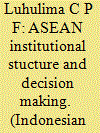

|
|
|
|
|
| Publication |
2002.
|
| Description |
396-415
|
|
|
|
|
|
|
|
|
|
|
|
|
|
|
|
| 19 |
ID:
021996
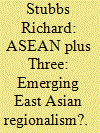

|
|
|
|
|
| Publication |
May/June 2002.
|
| Description |
440-455
|
|
|
|
|
|
|
|
|
|
|
|
|
|
|
|
| 20 |
ID:
063031
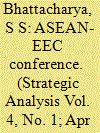

|
|
|